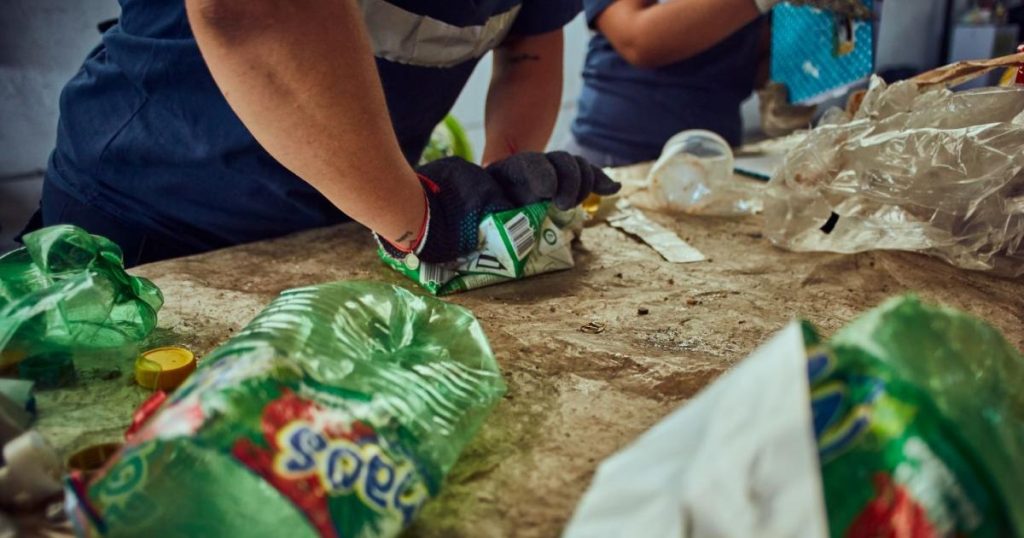Financing the end of plastic pollution
5 min read
This article is sponsored by Delterra.
Next week, as many as 175 countries will come together in Nairobi, Kenya, for the third of five negotiation sessions to develop the first legally binding international treaty to end plastic pollution.
Ending plastic pollution is a complicated and daunting task. The initial draft agreement already includes multiple elements that, on their own, are complex issues, including avoiding negative impacts on human health; regulating trade of materials; implementing extend producer responsibility (EPR); lowering emissions from plastics; and ensuring fairness for vulnerable communities.
It’s clear that plastic pollution has far-reaching ripple effects that affect more than just this category of polymers. For this agreement to be effective, it needs to have a system-change approach that encompasses waste management as a whole.
At the top of the agenda in Nairobi the agenda should be a concrete plan for how to finance this massive economic, environmental and social shift — especially for Global South countries, the most affected by plastic pollution and the least equipped to deal with it.
Supporting countries in the Global South
Looking at effective waste management as a necessary foundation for collecting, sorting, processing and reusing materials, it becomes clear that financing is critical but severely lacking in many countries for building these systems.
For those living in Global North countries, financing might not feel like a big issue. Our taxes provide waste management and recycling services in most places. While whether those services are effective is another issue, the system is meant to be financially viable as a public utility like water or electricity.
But many Global South countries lack the basic waste collection services and infrastructure that others take for granted. This lack of basic services for over 2 billion people is one of the reasons for high rates of burning, dumping and discarding of waste into the environment. The IFC estimates that there is a $40 billion shortfall in funding to fix this gap in municipal waste services globally.
In Bali, Indonesia, where Delterra is working to build circular waste and recycling systems, waste collection is highly fragmented and managed at the sub-municipal level — village-by-village. Collection is not paid for by taxes and is largely done informally by independent waste collectors. While high-value materials such as PET plastic bottles are opportunistically collected and sold, the rest of the waste goes to an open dumping landfill, burned or leaked into the environment.
The island lacks basic waste management infrastructure and recycling is caught in a vicious cycle of insufficient supply and inconsistent demand for recycled materials — resulting in localized burning and over-reliance on already overfilled waste dumps. The situation is similar in other parts of Indonesia, Asia, Africa and other regions.
Commitments without action yield nothing
In Indonesia, the government is working to change this situation including their plan to reduce plastic leakage by 70 percent by 2025, achieve net zero plastic pollution by 2040 and launch a financing task force to secure “$18 billion for waste management and recycling between 2017 and 2040, and an estimated $1 billion per year increase in operational financing.” However, financing this transition is complicated by a lack of ROI on most parts of the waste management system.
There are plenty of other examples where governments and companies have made bold commitments to tackle plastic pollution but struggled to put those aspirations into action. For example, over 1,000 companies have signed the Global Commitment for a circular economy for plastics but “key 2025 targets are expected to be missed” at least in part due to lack of supply. It turns out that an increased demand for recycled plastic content on its own is not enough to unlock the supply of that material if the system that’s supposed to deliver that supply doesn’t exist or is fundamentally broken.
Overcoming main financing challenges
Based on Delterra’s experience working hands-on to transform upstream and downstream circular waste systems in over 10 cities in Latin America and Indonesia, we have learned that the current financing structure is failing the Global South for several reasons:
- Governments do not always have the expertise to know what type of investments are needed to shift towards zero waste and might have negative experiences of being sold unproven or inappropriate technologies. As a result, many waste-to-energy or incineration projects, most without the proper environmental protections, are favored because they are a simple (albeit misguided) solution to a complex problem.
- Most waste management and recycling infrastructure does not offer a competitive rate of return if any. Meanwhile, investors are often looking for market rate or above returns, putting governments into even further debt if they do choose to focus on waste management. As a result, governments often prioritize other issues for spending such as education, healthcare and roads.
- There is a gap in funding to develop the business case and feasibility for investments including proper consideration of the operating costs and required capability building on the ground. Small grants, philanthropy and the private sector sometimes step in, but there is insufficient money, expertise and time dedicated to supporting cities to develop fit-for-purpose CapEx and OpEx strategies.
Within the context of the Global Plastics Treaty, especially under the financing section, we urge countries to agree to the following actions:
- Contribute to a multilateral fund that distributes grants to Global South countries for capability building, business case development and technical assistance — similar to the COP27 Loss and Damage Fund
- Develop a global playbook for effective national circular waste, including a system for cascading learnings from implementation in other countries, and programs to build the capacity of national governments (for example, building from Delterra’s Circular Cities framework)
- Provide long-term operations and implementation capability funding alongside all capital expenditure to ensure its sustainability
- Stimulate private sector investment through innovative financial mechanisms including debt swaps, de-risking (sovereign guarantees), payment-by-results and project preparation funding
The insufficient and limited funding that does exist is often not fit-for-purpose, requiring a return-on-investment (that waste management cannot deliver) and lacking allowances for the requisite capability building and operational expenses to avoid “white elephant” projects. The Global Plastics Treaty offers a critical opportunity to support Global South countries and cities with nascent waste management systems to overcome these challenges by providing appropriate funding, technical expertise and capability building — thus allowing them to leapfrog the waste management mistakes of the Global North’s past.



